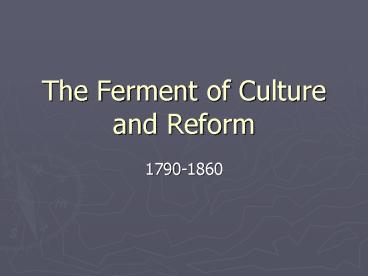The Ferment of Culture and Reform - PowerPoint PPT Presentation
1 / 14
Title:
The Ferment of Culture and Reform
Description:
The Ferment of Culture and Reform 1790-1860 Reviving Religion Vast changes in theology and religion Deism believed in a supreme being who had created the universe ... – PowerPoint PPT presentation
Number of Views:116
Avg rating:3.0/5.0
Title: The Ferment of Culture and Reform
1
The Ferment of Culture and Reform
- 1790-1860
2
Reviving Religion
- Vast changes in theology and religion
- Deism believed in a supreme being who had
created the universe and enabled humans with
capacity for moral behavior - In God We Trust ??
- Reliance on reason, science (Enlightenment)
- Disbelief in original sin, divinity of Christ
- God as ONE not Father, Son and Holy Spirit
- Free will
- Salvation through good deeds
- Influenced many reforms temperance, suffrage,
slavery
3
Second Great Awakening Revivals
- Second Great Awakening circa 1800
- Reached an even larger audience than did the
First Great Awakening - Revivals Traveling religious festivals
- BIG WHITE TENT
- Energetic, entertaining preachers
- Stimulated church membership in all parts of the
country - Growth of the Baptists and Methodists
- Feminization of religion
4
Denominational Diversity
- Religious affiliation tended to derive from
class. - Most intellectual, wealthy were Episcopalians,
Presbyterians, Unitarians - Concentrated in the North
- Most uneducated, poor were Baptists and
Methodists - Concentrated in the South
- First the churches split, then the political
parties split, then the Union split.
5
A Desert Zion in Utah
- Joseph Smith
- Founder of the Mormon faith
- Oppression from those disapproving of Mormons
forced them to constantly relocate - Shot and killed by mob
- Brigham Young takes over
- Moves Mormons west to Salt Lake City, Utah
6
Free Schools for a Free People
- Public education originally seen as education
of poor only looked down upon - Rich people Why should my tax money go to these
brats who will only cause me trouble? - Expansion of suffrage cry for free education
- Laboring factory works on the Industrial
Revolution demanded tax-supported education for
children - A civilized nation that was both ignorant and
free never was and never will be Thomas
Jefferson
7
Problems with early public schools
- South was very reluctant to enact public
education system - Schools only stayed open a few months a year
- Ill-trained, ill-paid, ill-tempered MALE teachers
- Eventually would be deemed essential to promote
stability and democracy
8
Horace Mann (1796-1859)
- Secretary of Board of Education, MA
- Campaigned for more and better schoolhouses,
better teachers, higher teacher pay, expanded
curriculum - Influence spread to other states (Constitution
leaves education up to states) - Blacks from all parts of country forbidden from
schools - Breeding of Citizens Pledge of Allegiance
9
Higher Goals for Higher Learning
- State supported universities spring up in the
South (Jeffersons University of Virginia) - Stark contrast to the private, Ivy League schools
in the North - Co-education of men/women looked down upon
- Female only colleges
- Tax-supported public libraries
- Network of educational speakers
- Magazines
10
An Age of Reform
- The optimistic promises of the Second Great
Awakening inspired countless souls to do battle
against earthly evil. - Goal to create a perfected society (Utopia) free
from cruelty, war, intoxicating drink,
discrimination, and slavery. - Dawn of Capitalism and adjusting socially to
the changing world.
11
Dorothea Dix
- New England teacher
- Fought for rights of incarcerated prisoners and
mentally ill - Traveled cross-county collecting research on
prison/hospital conditions - Petitioned the MA legislature to pass measures
for improvement of prisoner/patient treatment
12
Temperance
- Temperance movement to reduce alcohol
consumption/abuse in US - Excessive alcohol consumption caused fights,
decrease in efficiency of labor, work accidents,
sanctity of the family (safety of the children) - Affected all walks of life Men, women, children,
clergymen, politicians - Maine Law of 1851 prohibited the sale and
distribution of liquor in Maine other NE states
followed eventually expired or ruled
unconstitutional
13
Women in Revolt
- At the beginning of the 19th century, women were
socially comparable to slaves - They could not vote
- Expected to remain sub servant to a master
(husband in this case) - Beating of women was legal (Rule of Thumb)
- Could not retain property rights when wed all
property went to husband - Better than conditions of women in Europe rape
was punishable by death here
14
Ticket out the Door
- Choose a reform movement. (Temperance, Public
Schools or Womens Suffrage) - On a blank piece of paper, I want you to divide
the page in half. - In each half I want you to draw a large outline
of a face. - In each face, I want you to draw opposing side
REACTIONS to these reform movements. - These are due at the end of class!

